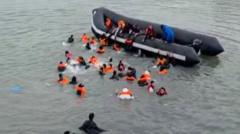Will France Overcome Delays and Turmoil to Intercept Migrant Boats?

Published: 2025-10-23 06:00:13 | Category: technology
The recent decision by France to scale back its commitment to strengthen maritime interventions against small boats crossing the English Channel has significant implications for the UK government's strategy to address illegal migration. Despite earlier assurances of a new "maritime doctrine" aimed at intercepting and returning inflatable boats, reports suggest that political turmoil in France has led to a retreat from these plans, leaving UK border security officials frustrated and migrant crossings continuing unabated.
Last updated: 09 October 2023 (BST)
What’s happening now
Currently, France is retreating from its earlier commitments to enhance maritime operations against small boat crossings in the English Channel. This setback is attributed to internal political challenges in France, which have led to a lack of coherent policy direction on this pressing issue. As a result, overcrowded inflatable boats are still departing from French shores daily, with reports indicating that police intervention remains minimal, if not entirely absent in many cases.
Key takeaways
- France is reportedly stepping back from its commitment to a new maritime doctrine aimed at intercepting small boats.
- The ongoing political turmoil in France is impacting border security measures.
- Migrant crossings continue, with numerous departures recorded from the French coast daily.
Timeline: how we got here
The situation regarding small boat crossings has been evolving over the past few years, with key events including:
- July 2022: A summit between French President Emmanuel Macron and UK Prime Minister Sir Keir Starmer aimed at addressing the issue.
- January 2023: France announced plans for a new maritime doctrine to enhance patrols and intercept boats.
- October 2023: Reports emerge that France is backing away from these commitments due to political instability.
What’s new vs what’s known
New today/this week
Recent reports indicate that the French government is not moving forward with its promised maritime interventions. The political climate in France, characterised by instability and internal crises, has resulted in a lack of decisive action against smugglers operating in the English Channel.
What was already established
Previously, there was an expectation that the new maritime doctrine would lead to increased French naval activity aimed at intercepting small boats. However, these plans appear to have never been fully realised, as indicated by ongoing migrant crossings and the reported reluctance of French authorities to engage directly with the boats.
Impact for the UK
Consumers and households
The continuing influx of small boat crossings could have implications for UK households, particularly concerning public safety and resource allocation for border security. Ongoing discussions about the cost of managing these crossings may impact public spending and lead to heightened political tensions surrounding immigration policy.
Businesses and jobs
For businesses, particularly those in coastal areas and the fishing industry, the ongoing crisis can create an atmosphere of uncertainty. The perception of safety and security in these regions may affect tourism and local economies.
Policy and regulation
The UK government is likely to face pressure to revise its approach to immigration and border security in light of the current situation. The Sandhurst Treaty, which outlines collaboration between the UK and France on this issue, is also up for renegotiation, making this a crucial time for policy-makers.
Numbers that matter
- Over 150 km (90 miles) of French coastline are currently under surveillance for illegal crossings.
- Reports indicate that up to four boats may depart from a single canal in a single day.
- The UK government continues to invest significantly in French border security operations under the Sandhurst Treaty, although exact figures are under negotiation.
Definitions and jargon buster
- Maritime Doctrine: A set of guidelines and policies governing naval operations and interventions.
- Smugglers: Individuals or groups involved in illegally transporting people across borders for profit.
How to think about the next steps
Near term (0–4 weeks)
In the immediate future, UK officials may need to reassess their strategies regarding French cooperation on maritime issues. Close monitoring of the situation on the French coast will be crucial.
Medium term (1–6 months)
In the coming months, discussions regarding the Sandhurst Treaty will be pivotal. The UK government may need to consider alternative measures to handle the ongoing migrant crisis.
Signals to watch
- Changes in French government policy regarding maritime interventions.
- Updates on negotiations surrounding the Sandhurst Treaty.
- Reports of migrant crossings and any changes in response from UK border officials.
Practical guidance
Do
- Stay informed about policy changes regarding border security and immigration.
- Engage with local communities affected by migration issues to understand their perspectives.
Don’t
- Don’t jump to conclusions about the effectiveness of current policies without considering the complexities involved.
- Don’t overlook the humanitarian aspects of the migrant crisis while focusing on enforcement.
Checklist
- Monitor news updates regarding French border policies.
- Understand local impacts of migration on communities and businesses.
- Stay aware of upcoming discussions on the Sandhurst Treaty.
Risks, caveats, and uncertainties
There are significant uncertainties surrounding the effectiveness of any future interventions. Potential legal ramifications of maritime operations could deter French authorities from taking decisive action. Moreover, the rapid shifts in the political landscape may lead to further changes in policy, complicating efforts to manage the situation effectively.
Bottom line
The retreat of France from its earlier commitments to maritime interventions against small boat crossings marks a critical juncture in the ongoing migration crisis in the English Channel. With political stability in France under threat, the UK must navigate these challenges carefully as it seeks to manage its border security effectively.
FAQs
What does France's retreat mean for UK border security?
France's retreat from maritime interventions complicates the UK’s efforts to manage small boat crossings, potentially leading to increased arrivals and public concern over border security.
Why are migrant boats still leaving France?
Migrant boats continue to leave France due to ongoing demand for passage to the UK, despite increased awareness and the risks involved in crossing the Channel.
What role does the Sandhurst Treaty play in this situation?
The Sandhurst Treaty outlines cooperation between the UK and France on border security, and its renegotiation will be crucial in determining future strategies to manage migrant crossings.



